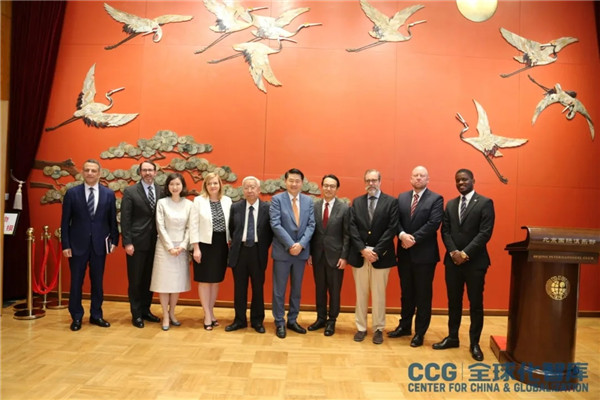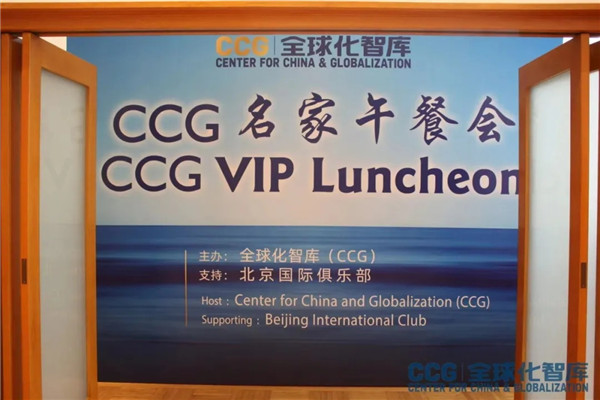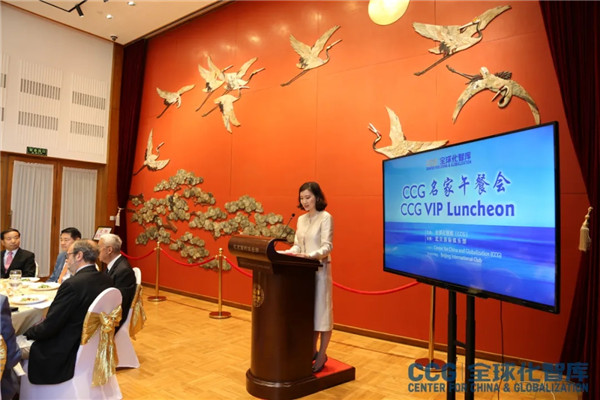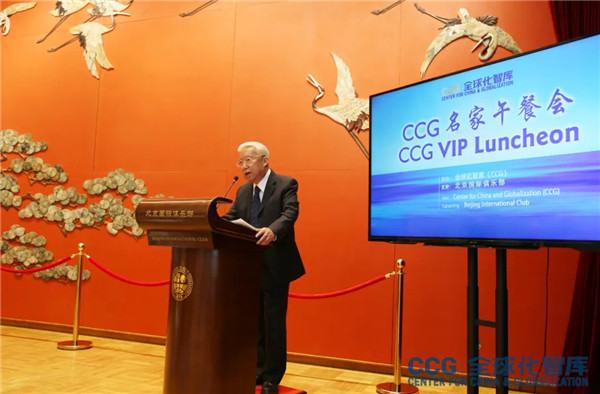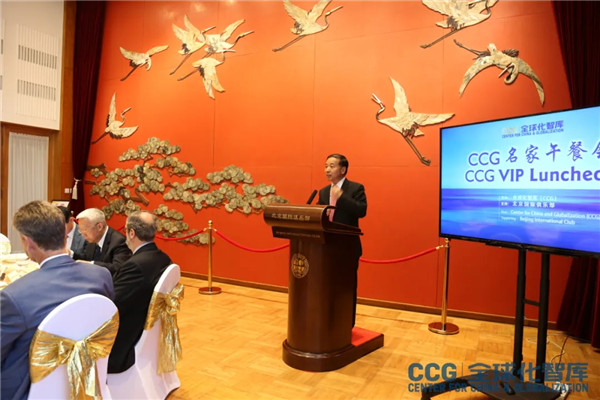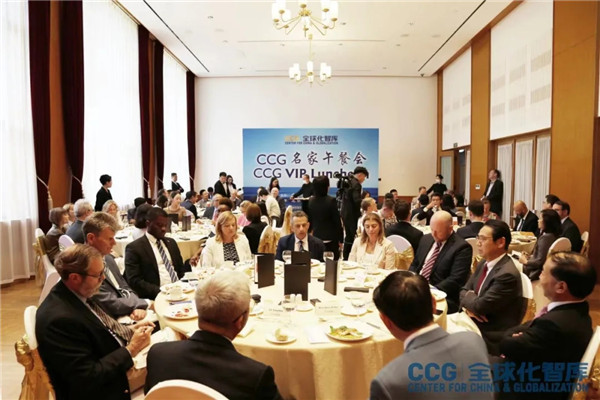CCG holds VIP Luncheon on China’s economic outlook
May 14 , 2024On May 14, 2024, the inaugural “CCG VIP Luncheon” event, initiated by the Center for China and Globalization (CCG) and supported by the Beijing International Club, was successfully held at the historic Xianhe Hall of the Beijing International Club.
The luncheon featured presentations by Dr. Yu Yongding, former Director of the Institute of World Economics and Politics at the Chinese Academy of Social Sciences (CASS) & former Member of the Monetary Policy Committee of the People’s Bank of China, and Dr. Zong Liang, Chief Researcher of Bank of China, on the latest economic outlook and analysis of China. Attendees included ambassadors from 10 countries and 17 senior diplomats, representatives from 14 international organizations and business associations, five heads of multinational corporations, as well as several heads of China bureaus of international media outlets and experts from academic and think tank communities.
Dr. Henry Huiyao Wang, President of CCG and former Counsellor to the State Council, shared the purpose of the CCG VIP Luncheon, which was to create a new high-end platform for international exchanges on key topics in Beijing and warmly welcomed guests to actively participate in the discussion. Dr. Mabel Lu Miao, Secretary General of CCG, gave intoduction remarks.
Dr. Yu Yongding first gave a brief introduction to the state of economic development in China, noting that recently many have suggested that the Chinese economy is on the brink of a crisis. However, he reminded hat anyone attempting to predict the future of the Chinese economy must maintain a very cautious attitude because it could reflect on one’s own academic reputation. He stated that the Chinese economy has sustained high growth for nearly 40 years, and now it is transitioning from high speed to high quality, so a slowdown in growth in the future is a very natural phenomenon. Achieving a growth target of around 5% in 2024 is reasonable and realistic for China. However, this process will not be smooth; it will require addressing challenges such as a slowdown in personal consumption and a decline in the growth rate of real estate investment. Under these circumstances, if reciprocal financing can proceed smoothly, if enterprises can obtain sufficient funds, and if investment in infrastructure can achieve close to double-digit growth, then there is no doubt that China will achieve its 5% growth target.
Dr. Zong Liang stated that China’s GDP grew by 5.2% year-on-year in 2023, while the global economic growth rate was around 3% with the economic growth rate of Western developed countries was approximately 4% and around 4.5% for developing countries. This indicates that China’s economy generally rebounded in 2023 and its growth rate ranked among the top major economies in the world. He mentioned that China’s GDP growth target for 2024 is around 5%, which he believes puts it in a leading position to dominate global economic growth. Currently, many regions in China have implemented policies to cancel restrictions on property purchases, and more preferential policies can be introduced to stabilize the domestic real estate market.
Next, Dr. Henry Huiyao Wang, President of CCG and former Counsellor to the State Council, provided his own views on topics such as the new stage of development in the Chinese economy, which will bring with it many challenges and opportunities. He believes that China’s economy is currently in a transitional period, but new quality productivity is developing rapidly, and China’s “new three pillars” of production are still far from meeting global demand for green capacity. Currently, the real estate industry, a pillar of the Chinese economy, has significantly weakened. In response to this, China could consider accelerating urbanization for its 300 million rural migrant workers by opening up the free transfer and trading of rural residential land, revitalizing idle rural residential land and farm resources, enabling these 300 million rural migrant workers to obtain their first “pot of gold”, settling down in urban areas, which would narrow the income gap among residents, further unleash the potential domestic demand for economic growth, promoting the exchange of urban and rural resources, and injecting new impetus into the promotion of economic and social sustainable development and achieving common prosperity in the new stage of China’s reform and opening up.
During the Q&A session, in a friendly and candid atmosphere, ambassadors from various countries, executives of multinational corporations, representatives of chambers of commerce, and academic experts engaged in in-depth discussions and interactive exchanges with the speakers. The dialogue was productive and attendees expressed their appreciation if this inaugural CCG VIP Luncheon, adding that they looked forward to participating in more high-quality events like this.
Foreign diplomats in China attending this event include H.E. Mr. Assem Hanafi, Ambassador of Egypt to China, H.E. Mr. Hallam Henry, Ambassador of Barbados to China, H.E. Mr. Thorir Ibsen, Ambassador of Iceland to China, H.E. Ms. Milia Jabbour, Ambassador of Lebanon to China, H.E. Mr. Kanasugi Kenji, Ambassador of Japan to China, H.E. Ms. Maija Manika, Ambassador of Latvia to China, H.E. Mr. Grahame Morton, Ambassador of New Zealand to China, H.E. Mr. Paulo Jorge Nascimento, Ambassador of Portugal to China, H.E. Alenka Suhadolnik, Ambassador of Slovenia to China, Tone Helene Aarrvik, Counsellor, Head of Economic Team, Embassy of Norway, Thibault Alix, Financial Attaché, Embassy of France to China, Richard Blackwood, Acting Unit Chief, Strategic Industries and Trade Unit, Economic Section at the U.S. Embassy in China, Cristina Carenza, Deputy Chief of Mission, Embassy of Italy, Jacob Cutts, First Secretary, Embassy of Canada to China, Maja Franković, Minister Counsellor, Economic Affairs, Embassy of Croatia to China, Robert Gillespie, First Secretary Head of Economic Analysis, British Embassy to China, Andrea Katharina, Commercial Counsellor, Embassy of Germany to China, Dean Lee, Counsellor, Embassy of Singapore to China, Atakan Ozdemir, Chief Trade Counsellor, Embassy of Turkey to China, Adam Pickford, Economic Counsellor, British Embassy to China, Bernhard Schwartlander, Global Health Envoy, Embassy of Germany to China, Asaf Shirman, Financial Attaché, Embassy of Israel to China, Abhishek Shukla, Deputy Chief of Mission, Embassy of India to China, Parulian Silalahi, Minister & Deputy Chief of Mission, Embassy of Indonesia to China, Jan Sitar, Commercial Counsellor, Economic Affairs, Embassy of Slovenia, and Mojca Dezelak, Deputy Head of Mission at the Embassy of Slovenia in China.
Representatives from international organizations and business associations attending this event included Stephan Bernhardt, Vice Chairman, European Union Chamber of Commerce in China; Adam Dunett, Secretary General of the European Chamber of Commerce; Viola De Canossa, Development Economist and Head of Policy and Research Team of UNDP; Kevin Chua, Senior Economist at the World Bank; Tamas Hajba, OECD Representative in China; Alfredo Montufar-Helu, Head of the China Center for Economics and Business at The Conference Board; Li Wen, Chief of Mission, IOM; Elitza Mileva, Lead Economist & Program Lead of Equitable Growth, World Bank; Martin Mueller, Honorary Chairman of the Swiss Chinese Chamber of Commerce(SwissCham); Ira Ovesen, Deputy Representative of UNFPA in China; Qin Hu, Vice President of Environmental Defense Fund (EDF), Chief Representative of Beijing Office; Amakobe Sande, UNICEF Representative in China; Shaikh Muhammad Shariq, Representative of National Bank of Pakistan in China; and Smriti Aryal, Head of China Office, UN Women.
Representatives from multinational corporations in attendance included Agnes Cui, Vice President, Government Relations, Greater China, IBM; Jerry Guo, Managing Director, KKR Capital Group; Shauna Huang, Vice President, External Affairs, Universal Pictures China; LENG Yan, Executive Vice President, Daimer Greater China; and Miranda Wang, Managing Director, ETS China.
International media representatives included Keith Bradsher, Beijing Bureau Chief, The New York Times; Jonathan Cheng, China Bureau Chief, The Wall Street Journal; Denis Staunton, China Correspondent and Beijing Bureau, Irish Times; and XIAO Xiao, The Wall Street Journal.
